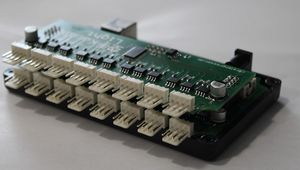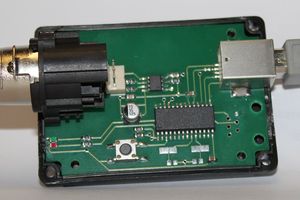The Open Lighting Project has moved!
We've launched our new site at www.openlighting.org. This wiki will remain and be updated with more technical information.
We've launched our new site at www.openlighting.org. This wiki will remain and be updated with more technical information.
Difference between revisions of "KarateLight"
From wiki.openlighting.org
| Line 5: | Line 5: | ||
First there is a RGB-LED-Dimmer, originally created for ambient lighting on TVs. The second one, by the name of KarateLight-DMX is a simple and cheap USB2DMX Intererface. The first prototype only supports sending DMX, but RDM support will be added in the next hardware revision. | First there is a RGB-LED-Dimmer, originally created for ambient lighting on TVs. The second one, by the name of KarateLight-DMX is a simple and cheap USB2DMX Intererface. The first prototype only supports sending DMX, but RDM support will be added in the next hardware revision. | ||
| + | == KarateLight Dimmer == | ||
[[Image:karatelight_dimmer_16ch_pcb.jpg|right|300px|16-Channel KarateLight Dimmer]] | [[Image:karatelight_dimmer_16ch_pcb.jpg|right|300px|16-Channel KarateLight Dimmer]] | ||
| − | |||
* 8/16 RGB Channels for 12V LED-Stripes | * 8/16 RGB Channels for 12V LED-Stripes | ||
* 60 Watt Output Power (or 120Watt for 24V LEDs) | * 60 Watt Output Power (or 120Watt for 24V LEDs) | ||
* 12Bit color resolution (Gamma-Lookup Table in the Firmware | * 12Bit color resolution (Gamma-Lookup Table in the Firmware | ||
* 1kHz PWM frequency | * 1kHz PWM frequency | ||
| − | * Free Hardware. Get the schematic and build your own device | + | * Free Hardware (CC-BY-NC-SA). Get the schematic and build your own device |
* Firmware-upgrade over USB | * Firmware-upgrade over USB | ||
<br> | <br> | ||
| + | == KarateLight DMX Interface == | ||
[[Image:karatelight_dmx_prototype_pcb.jpg|right|300px|KarateLight USB2DMX Interface]] | [[Image:karatelight_dmx_prototype_pcb.jpg|right|300px|KarateLight USB2DMX Interface]] | ||
| − | |||
* From USB to [[DMX]] (one way DMX; RDM will be added in the next version) | * From USB to [[DMX]] (one way DMX; RDM will be added in the next version) | ||
* The DMX data is buffered and the transmission is timed by the microcontroller | * The DMX data is buffered and the transmission is timed by the microcontroller | ||
| Line 26: | Line 26: | ||
<br> | <br> | ||
| − | Software | + | == Software == |
* Supported by [[OLA]] on Linux | * Supported by [[OLA]] on Linux | ||
* Plugin support for most Enigma2 Settop-Boxes | * Plugin support for most Enigma2 Settop-Boxes | ||
Latest revision as of 14:15, 25 May 2013
Link: http://karatelight.de
{{ #if: | ![]() }}{{ #if: yes |
}}{{ #if: yes | ![]() }}{{ #if: yes |
}}{{ #if: yes | ![]() }}{{ #if: |
}}{{ #if: | ![]() }}{{ #if: yes |
}}{{ #if: yes | ![]() }}{{ #if: |
}}{{ #if: | ![]() }}{{ #if: |
}}{{ #if: | ![]() }}{{ #if: |
}}{{ #if: | ![]() }}{{ #if: |
}}{{ #if: | ![]() }}
}}
There are two different Devices, both with the name KarateLight. They are both opensource and use the same protocol. Both are supported by the OLA karate-plugin. First there is a RGB-LED-Dimmer, originally created for ambient lighting on TVs. The second one, by the name of KarateLight-DMX is a simple and cheap USB2DMX Intererface. The first prototype only supports sending DMX, but RDM support will be added in the next hardware revision.
KarateLight Dimmer
- 8/16 RGB Channels for 12V LED-Stripes
- 60 Watt Output Power (or 120Watt for 24V LEDs)
- 12Bit color resolution (Gamma-Lookup Table in the Firmware
- 1kHz PWM frequency
- Free Hardware (CC-BY-NC-SA). Get the schematic and build your own device
- Firmware-upgrade over USB
KarateLight DMX Interface
- From USB to DMX (one way DMX; RDM will be added in the next version)
- The DMX data is buffered and the transmission is timed by the microcontroller
- USB powered
- No galvanic isolation (will be added in the next version)
- Free Hardware (CC-BY-NC-SA). Get the schematic and build your own device
- Firmware-upgrade over USB
Software
- Supported by OLA on Linux
- Plugin support for most Enigma2 Settop-Boxes
- Supported by boblight (Win, Linux, Mac)
- Supported by AtmoWin (Windows)
- Supported by DFAtmo (Xbmc, VDR, xinelib)
- Firmware is based on the Microchip-USB-Stack for Pic18 Controllers which is free-as-in-beer but not free-as-in-speech. The non-Microchip parts are GPL.

